Audi Q4 e-tron vs Hyundai Kona - Differences and prices compared
Compare performance (340 HP vs 218 HP), boot space and price (39600 £ vs 23100 £ ) at a glance. Find out which car is the better choice for you – Audi Q4 e-tron or Hyundai Kona?
Costs and Efficiency:
Price and efficiency are often the first things buyers look at. Here it becomes clear which model has the long-term edge – whether at the pump, the plug, or in purchase price.
Hyundai Kona has a clearly advantage in terms of price – it starts at 23100 £ , while the Audi Q4 e-tron costs 39600 £ . That’s a price difference of around 16500 £.
In terms of energy consumption, the advantage goes to the Hyundai Kona: with 14.60 kWh per 100 km, it’s barely noticeable more efficient than the Audi Q4 e-tron with 15.90 kWh. That’s a difference of about 1.30 kWh.
As for electric range, the Audi Q4 e-tron performs slight better – achieving up to 554 km, about 40 km more than the Hyundai Kona.
Engine and Performance:
Under the bonnet, it becomes clear which model is tuned for sportiness and which one takes the lead when you hit the accelerator.
When it comes to engine power, the Audi Q4 e-tron has a distinct edge – offering 340 HP compared to 218 HP. That’s roughly 122 HP more horsepower.
In acceleration from 0 to 100 km/h, the Audi Q4 e-tron is clearly quicker – completing the sprint in 5.40 s, while the Hyundai Kona takes 7.80 s. That’s about 2.40 s faster.
In terms of top speed, the Hyundai Kona performs a bit better – reaching 210 km/h, while the Audi Q4 e-tron tops out at 180 km/h. The difference is around 30 km/h.
There’s also a difference in torque: Audi Q4 e-tron pulls decisively stronger with 679 Nm compared to 265 Nm. That’s about 414 Nm difference.
Space and Everyday Use:
Cabin size, boot volume and payload all play a role in everyday practicality. Here, comfort and flexibility make the difference.
Both vehicles offer seating for 5 people.
In curb weight, Hyundai Kona is convincingly lighter – 1370 kg compared to 2035 kg. The difference is around 665 kg.
In terms of boot space, the Audi Q4 e-tron offers a bit more room – 535 L compared to 466 L. That’s a difference of about 69 L.
In maximum load capacity, the Audi Q4 e-tron performs somewhat better – up to 1490 L, which is about 190 L more than the Hyundai Kona.
When it comes to payload, Audi Q4 e-tron minimal takes the win – 515 kg compared to 490 kg. That’s a difference of about 25 kg.
Who wins the race in the data check?
The Audi Q4 e-tron is decisively ahead in the objective data comparison.
This result only shows which model scores more points on paper – not which of the two cars feels right for you.
Costs and Consumption
View detailed analysis
Engine and Performance
View detailed analysis
Dimensions and Body
View detailed analysis
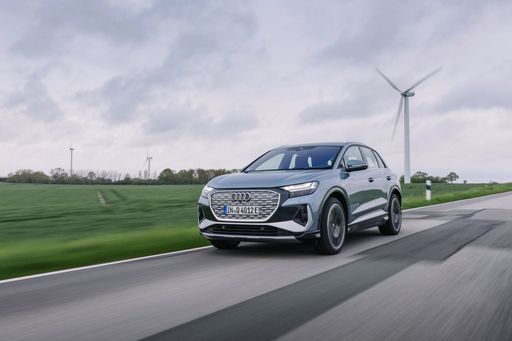
Audi Q4 e-tron
Audi Q4 e-tron
The Audi Q4 e-tron brings Audi polish into the electric crossover scene, pairing a sleek exterior with a refined, airy interior that makes everyday driving feel distinctly premium. It’s an easy-to-live-with EV that balances comfort and real-world usability with intuitive tech, making it a smart choice for buyers who want electric mobility without giving up Audi character — and yes, it still looks good in the driveway.
details
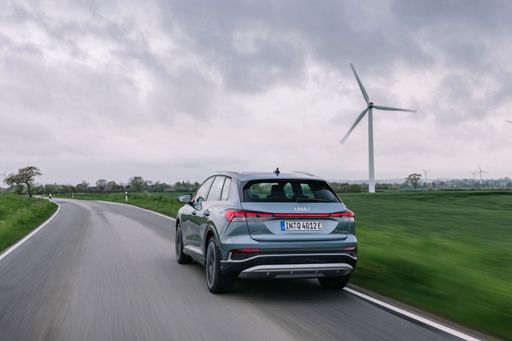
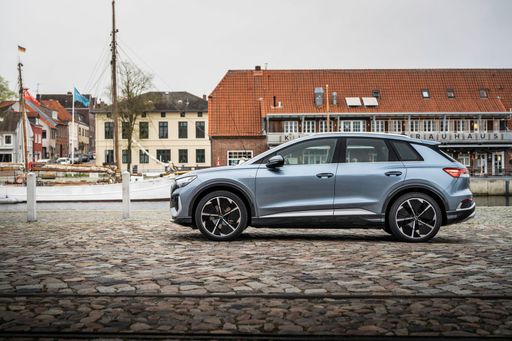
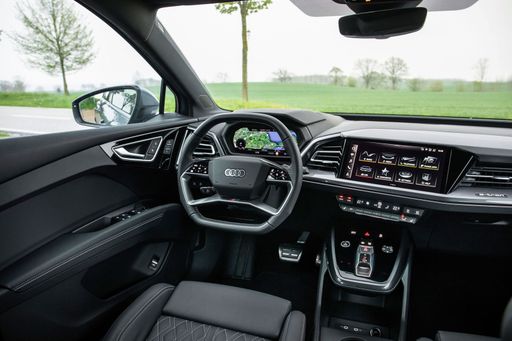
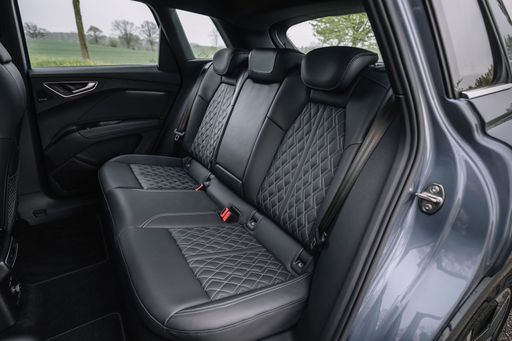
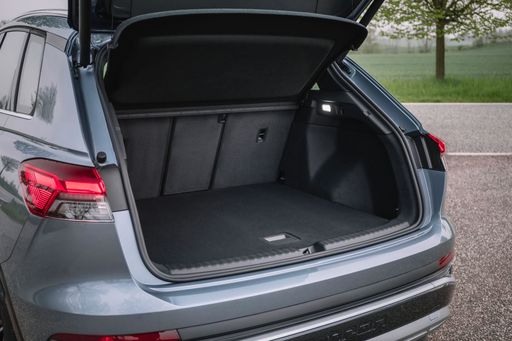
Hyundai Kona
The Hyundai Kona wears its personality on the outside with bold styling and sprightly handling that turns city driving into something a little more fun than a commute. It blends practical space, modern tech and sensible running costs into a compact, stylish package — a smart pick if you want flair without paying luxury prices.
details



Costs and Consumption |
|
|---|---|
|
Price
39600 - 58800 £
|
Price
23100 - 41600 £
|
|
Consumption L/100km
-
|
Consumption L/100km
4.6 - 7 L
|
|
Consumption kWh/100km
15.9 - 17.4 kWh
|
Consumption kWh/100km
14.6 - 16.8 kWh
|
|
Electric Range
406 - 554 km
|
Electric Range
377 - 514 km
|
|
Battery Capacity
59 - 77 kWh
|
Battery Capacity
1.3 - 65.4 kWh
|
|
co2
0 g/km
|
co2
0 - 163 g/km
|
|
Fuel tank capacity
-
|
Fuel tank capacity
38 - 47 L
|
Dimensions and Body |
|
|---|---|
|
Body Type
SUV
|
Body Type
SUV
|
|
Seats
5
|
Seats
5
|
|
Doors
5
|
Doors
5
|
|
Curb weight
2035 - 2235 kg
|
Curb weight
1370 - 1773 kg
|
|
Trunk capacity
520 - 535 L
|
Trunk capacity
466 L
|
|
Length
4588 mm
|
Length
4350 - 4385 mm
|
|
Width
1865 mm
|
Width
1825 mm
|
|
Height
1614 - 1632 mm
|
Height
1580 - 1585 mm
|
|
Max trunk capacity
1460 - 1490 L
|
Max trunk capacity
1300 L
|
|
Payload
505 - 515 kg
|
Payload
420 - 490 kg
|
Engine and Performance |
|
|---|---|
|
Engine Type
Electric
|
Engine Type
Electric, Petrol, Full Hybrid
|
|
Transmission
Automatic
|
Transmission
Automatic, Manuel
|
|
Transmission Detail
Reduction Gearbox
|
Transmission Detail
Reduction Gearbox, Manual Gearbox, Dual-Clutch Automatic
|
|
Drive Type
Rear-Wheel Drive, All-Wheel Drive
|
Drive Type
Front-Wheel Drive, All-Wheel Drive
|
|
Power HP
204 - 340 HP
|
Power HP
115 - 218 HP
|
|
Acceleration 0-100km/h
5.4 - 8.1 s
|
Acceleration 0-100km/h
7.8 - 11.9 s
|
|
Max Speed
160 - 180 km/h
|
Max Speed
162 - 210 km/h
|
|
Torque
310 - 679 Nm
|
Torque
200 - 265 Nm
|
|
Number of Cylinders
-
|
Number of Cylinders
3 - 4
|
|
Power kW
150 - 250 kW
|
Power kW
85 - 160 kW
|
|
Engine capacity
-
|
Engine capacity
998 - 1598 cm3
|
General |
|
|---|---|
|
Model Year
2023 - 2025
|
Model Year
2024 - 2025
|
|
CO2 Efficiency Class
A
|
CO2 Efficiency Class
A, D, C, E, F
|
|
Brand
Audi
|
Brand
Hyundai
|
What drive types are available for the Audi Q4 e-tron?
The Audi Q4 e-tron is offered with Rear-Wheel Drive or All-Wheel Drive.




